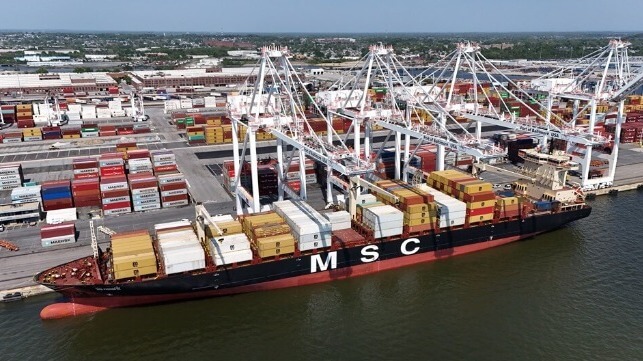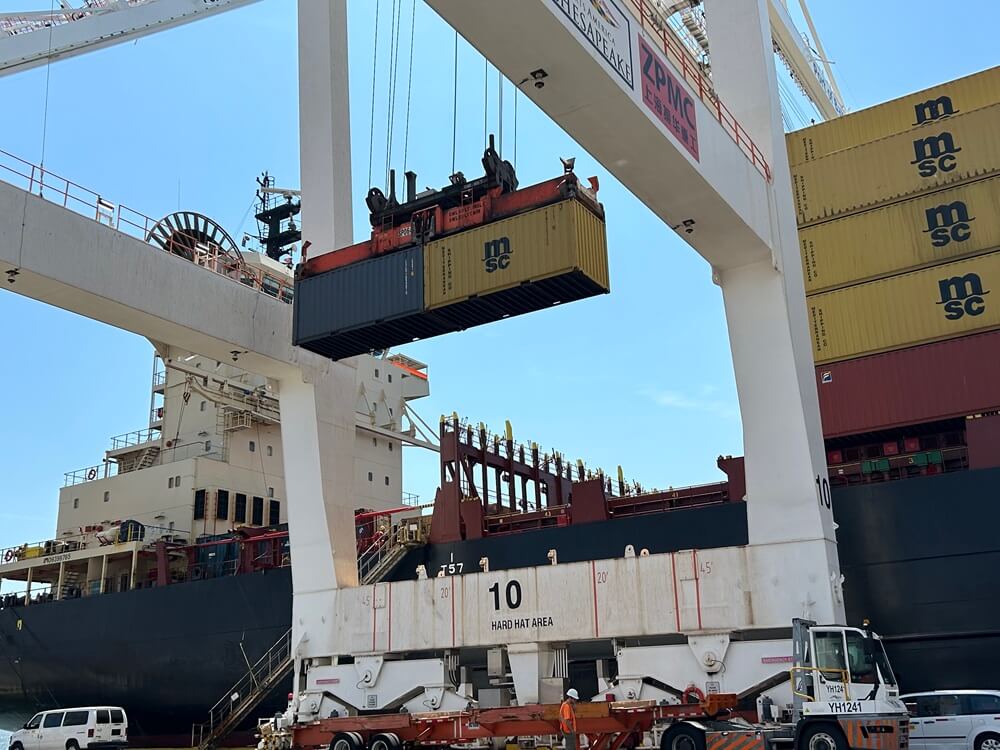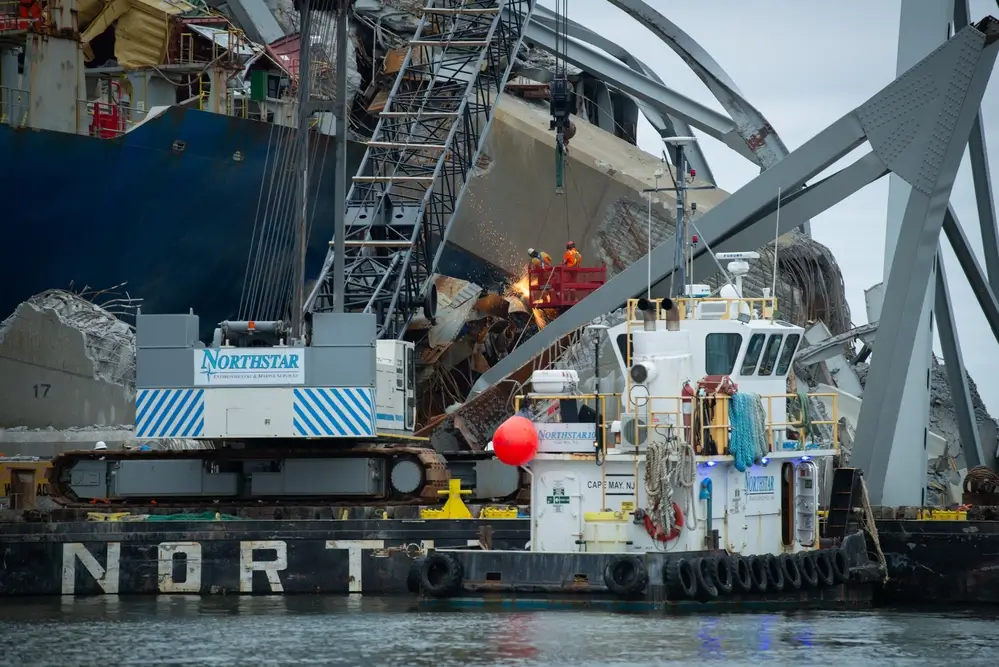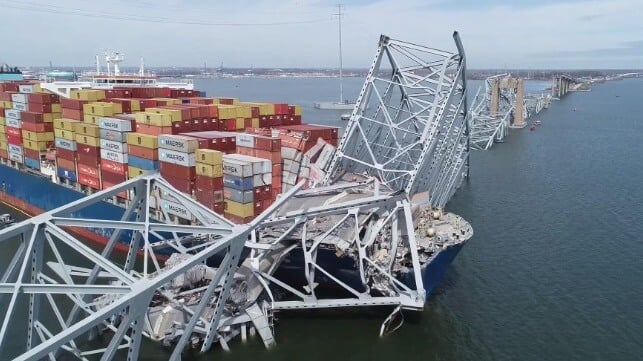Baltimore Welcomes its First Container Ship Since Bridge Collapse

On Saturday, the Port of Baltimore received its first container ship since the tragic collapse of the Francis Scott Key Bridge one month ago. The arrival is an important milestone for Baltimore businesses and longshoremen, who have been heavily impacted by the closure of the inner harbor.
At about 1730 hours local time on Saturday, the sub-Panamax MSC Passion III transited through the temporary 35-foot-deep shipping channel and moored alongside at Seagirt. About 80 union longshoremen were there to meet the ship and handle her cargo. The port is an important local source of well-paid jobs, and the longshore community has been particularly hard-hit by the closure.

Containers arrive off MSC Passion III (Port of Baltimore)
The Passion III is a 2,800 TEU feeder vessel - about average for the decade when the Key Bridge was built, but far smaller than the 10,000 TEU Dali or even larger modern ships that call Baltimore today. Passion III's small size allowed her to access the harbor: with her current draft of 30.5 feet, she could fit through the 35-foot-deep "limited access channel" that the Army Corps of Engineers recently cleared through the bridge's wreckage.
"Around that 35-foot draft is where you're really starting to get some of the inventory that's coming onboard that had really been some of the hallmarks of The Port of Baltimore," Maryland Gov. Wes Moore said at a news conference last week.
A container-on-barge service from Port of Virginia arrived as soon as the channel opened, but MSC Passion III was the first self-propelled boxship to enter the harbor. The complex operation to restore the waterway to its full navigable depth and remove the damaged boxship Dali is still under way, and will likely continue until the end of May.

Workers begin cutting through beams alongside the trapped boxship Dali, April 27 (USACE)
The litigation over the impact of the closure is just beginning. The latest complaint was a class-action lawsuit filed by Baltimore printing house American Publishing last week. The suit alleges that the publisher's local clients have stopped placing orders due to the effects of the port shutdown. The company claims that its revenue has plummeted by 84 percent compared with the same time last year. Much like an earlier suit brought by the City of Baltimore, American Publishing's civil action accuses the owner and operator of Dali of a "failure to ensure the seaworthiness of the vessel that ultimately led to the bridge’s destruction."
Maritime Chaplains Minister to Crew After Baltimore Bridge Collision

"Baltimore Key Bridge Collapses After Ship Collision" - this and similar headlines greeted us as we awoke on the morning of March 26. Within 48 hours, our industry partners reached out to the Seamen’s Church Institute to ask what SCI could do to support the seafarers aboard the container ship Dali, now trapped under the superstructure of the Key Bridge. Amid ongoing investigations by the U.S. Coast Guard and the National Transportation Safety Board (NTSB), access to the Dali was extremely limited. Yet, within a week of the allision, SCI was cleared to board the ship to provide support for the 21 seafarers still aboard the vessel. And so, on a stormy morning we boarded the launch and were ferried out to the Dali along with the surveyors and attorneys who were part of the investigation.
Boarding via the rope pilot ladder, SCI was the first seafarer welfare organization to meet with the crew and to offer crisis support through one-on-one and small group meetings with the Indian and Sri Lankan seafarers. After a full day aboard, and with a strong sense that the seafarers were well cared for by the ship’s operator, we returned home to plan a more extensive follow-up visit and to brief the local seafarer welfare organizations of the state of the crew and the situation aboard the ship.
In the world of global shipping, crises happen. What is unknown is when and where these events will occur. SCI has consistently demonstrated its readiness, dispatching its Chaplains, trained in Critical Incident Stress Management (CISM), to provide much-needed support and assistance in such situations. These deployments range from pirate attacks off the Somali coast, a ship sinking in the Atlantic, onboard fatalities near Yokohama, capsized workboats in the Gulf or on the Western rivers, and, in this most recent case, a fatal bridge allision in Baltimore Harbor.
After assessing the situation, what the crew of the Dali seemed to need most were maritime chaplains who spoke their native language, Hindi and Tamil. Fortunately, SCI has two trained Chaplain Associates who speak these languages and serve at SCI’s International Seafarers’ Center in Port Newark. Along with a third SCI Chaplain, this team mobilized for a follow-up visit. But then there was a new wrinkle.
On Monday. April 15, the FBI issued a statement to the media that FBI agents were “presently aboard the cargo ship Dali conducting court-authorized law enforcement activity.” SCI’s team was told to standby. After a two-day FBI investigation aboard the ship, SCI was green-lighted and the team of three boarded the early morning launch, carrying new SIM cards (for mobile phones) and other items for the crew of the Dali. The second visit could not have been more impactful or appreciated. After meeting with the Master, the crew showed up quickly and were eager to speak to our chaplains in Hindi, Malayalam, and Tamil, the dialects of India where most of the crew call home.
While the ship was well provisioned, there was concern over the uncertainty of their situation. An anticipated month-long sail to their next port, was now a yet-to-be-defined extended stay in Baltimore. The chaplains learned from the seafarers that their mobile phones and computers had been taken by the FBI as part of its investigation, meaning they had lost their contact numbers, WeChat, and WhatsApp applications to connect with family and friends, increasing the crew’s sense of isolation. However, herein lies another strength of our organization. Working through SCI’s Center for Mariner Advocacy, we contacted the appropriate U.S. Coast Guard authorities to advocate for the seafarers, and to ascertain if and when their phones would be returned by the FBI. By the following day, the ship’s operator had provided six new mobile phones for the crew’s use, with the understanding that the seafarers’ original phones eventually would be returned to them.
Going forward, SCI will continue to work with the various Baltimore-based seafarer organizations to provide for the crew of the Dali. While SCI has been focused on the Dali's crew, Baltimore’s local chaplains have continued to attend to the seafarers on the other vessels stuck in the port waiting for the channel to reopen, which may take weeks or months.
What does the crew of the Dali want most—other than the return of their mobile phones? Namely, items that remind them of home such as Indian-language periodicals and newspapers, Indian snack foods, toiletries, and ongoing support and vessel visits. Over the next several weeks, SCI will work with the local seafarer welfare groups to collect requested and needed items to be sent to the Dali's crew. And our Hindi, Malayalam, and Tamil-speaking chaplains will continue to travel to the ship for morale visits as part of SCI’s ongoing care and support.
Our service in Baltimore is our mission in action. SCI’s commitment to crisis response reflects our strategic objectives, demonstrating a dedication to providing effective and compassionate support for mariners and seafarers, no matter where in the world they may face challenging circumstances.
The Rev. Mark Nestlehutt is President and Executive Director of SCI.
The opinions expressed herein are the author's and not necessarily those of The Maritime Executive.
No comments:
Post a Comment